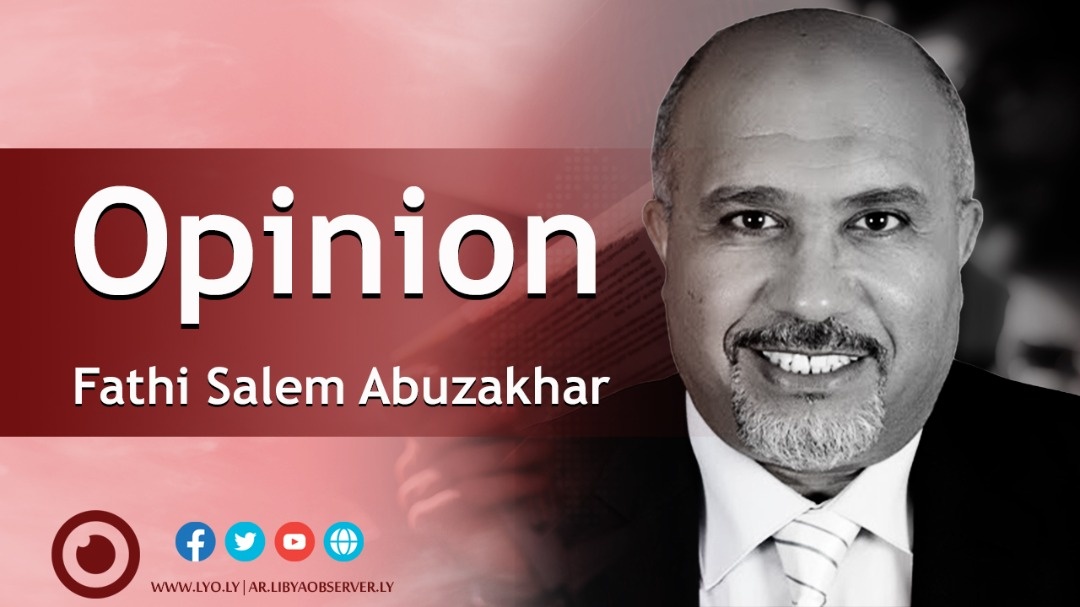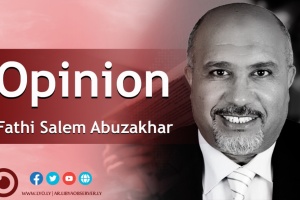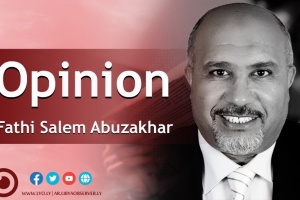By Fathi Salem Abuzakhar , a Libyan writer
February Revolution’s interest is with reconciliation

February Revolution triumphed over injustices of the dictatorship’s security in 2011, with the help of the UN Security Council resolution, though employed to serve vested interests and not to save the Libyan people. With the force of the triumphant movement, February was hardly able to continue for two years, due to existence of malicious pockets of opposition on the Libya soil.
The hidden struggle of the international community on the Libyan soil, played a major role in transforming February’s victory into a competition to win over a larger number of armed and civilian groups to serve hidden agendas. Instead of employing civil and military capacities in support of February Revolution and further its noble goals, they were deployed to fuel inter-Libyan conflict, especially after creating the appropriate conditions for the infiltration of the vindictive elements of the Jamahiriya system against February Revolution, due to the power and wealth wielded from the deep state, and further empowered by the information network as well as internal and international relations.
The February ranks were cracked due to the absence of a well-defined project with well-known literature and leadership, enabling the counter-revolution to lay hurdles and obstacles on the path of February Revolution, thereby derailing its quest to realize the aspirations of the people for building state of justice and law.
However, the military offensive against February Revolution in April 2019, with internal and international betrayal, unified the ranks and efforts of February supporters, from all Libyan cities, who rallied their forces in the capital, as they did in 2011. Indeed, they defended the capital and withstood the aggression of Wagner and Janjaweed militias and others. Furthermore, with the divine intervention, international calculations changed overnight and intervened in support of fighters of February Revolution to defeat the aggression and word them off beyond the safe borders of the capital and the western region as a whole. Today, there is an opportunity for the supporters of February Revolution to assess what has happened and work hard to achieve reconciliation.
With a thorough reading of the February march, it is possible to identify important stages for achieving national reconciliation, which the author presents as follows:
First: Despite complete missing of clear literature and a well-known leadership, the February uprising was popular in the real sense of the word. It was led by free intellectuals, academics, together with all other segments of society that were suppressed by the dictator’s security services and his revolutionary committees. The euphoria of victory had negative feedback after succumbing to the Political Isolation Law with all its flaws, and which hampered national reconciliation.
Second: With February’s need for supporters, the door was wide-opened for all experienced opportunists of the Jamahiriya regime, with access to many political prisons, thereby striking profitable financial deals related to the smuggling of leaders of the Jamahiriya, and foremost Saif al-Islam, providing them with the opportunity to work against national reconciliation.
Third: The international conspiracy against the uprisings of the Liberation Spring employed several methods to restore dictatorship and at any cost, even by sacrificing principles of freedom, human rights, justice and democracy. This is further deepened the national wound, causing a setback to transitional justice and national reconciliation.
Fourth: The escalating global conspiracy to abort the revolution of liberation, by enabling pro-Daesh military leaders, to stage a coup against the popular aspirations for a civilian state. Therefore, there was a proclamation freezing the Constitutional Declaration in 2014, followed by military maneuvers and clashes leading to the great preparation and rallying of conspiracy efforts in 2019 with a fierce military offensive on the capital, Tripoli. This is further deepened the national wound by employing the despicable and backward regionalism and tribalism, which further frozen the reconciliation processes up to the end of the war on October 23, 2020.
Fifth: Emergence of formal reconciliation calls, mostly geared to make political gains, and win key state positions to finalize pillars of the conspiracy and derail national reconciliation process.
Sixth: In addition to wars, there were malicious programmes designed to distract the people from national reconciliation by creating crises of fuel, liquidity, electricity, and even bread for the country’s population that number less than population of capitals of neighboring countries, yet in a country with great revenues and resources that exceed the revenues of countries of those capitals.
Seventh: Some of February's supporters fell into the traps of power and money, enabling enemies of February Revolution to challenge the very values advocated by February Revolution. As a result, the national reconciliation project was also delayed.
Disclaimer: The views and opinions expressed in this article are those of the writer, and do not necessarily reflect those of the Libya Observer



